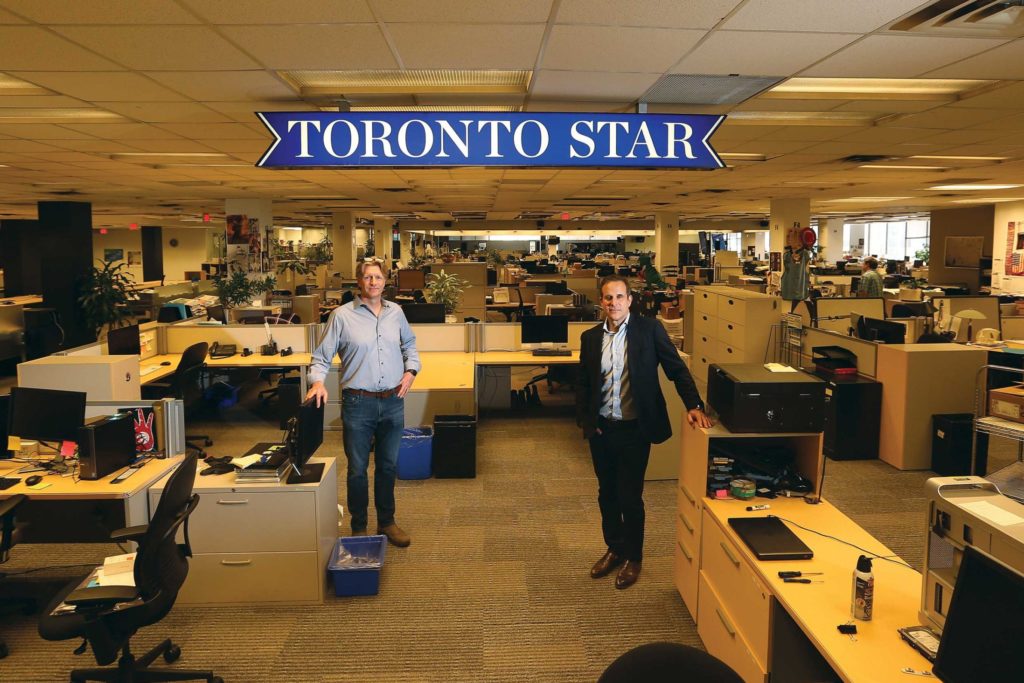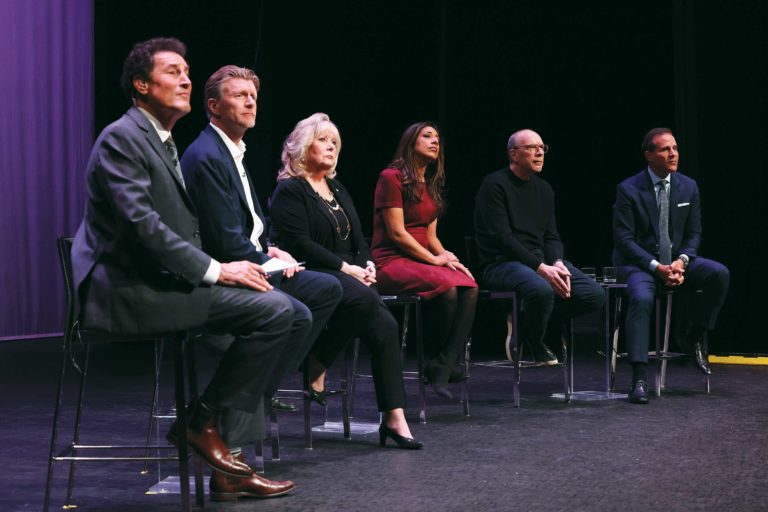
Jordan Bitove and Paul Rivett promised to lead the Toronto Star into a golden era. Within two years, their big egos and clashing visions nearly tore the company apart.
Inside the vicious battle for control of the country’s largest newspaper
by Jason McBride
Star Wars
February 8, 2023
Photograph by Patrick Marcoux
Jordan Bitove always thought it would be fun to own a newspaper.
In early 2020, his opportunity arrived: the Toronto Star was in trouble, and its owners wanted to sell. His late father, John, was a self-made millionaire who had bankrolled the construction of the SkyDome and had been a confidante to both Brian Mulroney and David Peterson. His older brother, John Jr., was a wireless and satellite radio mogul who had followed in their father’s footsteps, bringing the Raptors to Toronto and spearheading the city’s bid for the 2008 Olympics. At 55, Jordan was an entrepreneur and an investor, but he had yet to make his mark. At that point, his biggest claim to fame was the creation of Canada’s Walk of Fame on King Street West. Owning the Star promised profile, prestige and a chance to put his own Bitovian stamp on the city. While the paper was in dire financial straits, Bitove believed that it could be a smart investment. Torstar, the paper’s parent company, had nearly $60 million in cash and a bevy of undermonetized assets. He sent an email to John Honderich, Torstar’s chair and the Star’s former editor and publisher, asking to plead his case.
Honderich was intrigued. He was well-acquainted with the Bitoves, and he knew that Jordan was wealthy, well-connected, and by all accounts a kind and affable family man. He invited Bitove to One Yonge Street, the Star’s long-time headquarters, to meet the company’s voting trust. When Bitove walked into the fifth-floor boardroom in March of 2020, the atmosphere was solemn. The five families, as the voting trust was known, had controlled Torstar for more than 70 years, but now their company was at risk of falling apart. It was an old story—legacy media decimated and devoured by the internet—and the end of their particular chapter seemed imminent. They’d already made the tough decision to suspend one regular dividend payment. If the dividend was suspended for eight consecutive quarters, the families’ voting shares would convert and they’d instantly lose control of the company. Worse, after years of declining ad revenues and routine layoffs, plus a costly, misguided digital strategy, Torstar had recently posted a loss of $40.9 million.
The families had two options, neither of them appealing. They could shut it all down, but the severance costs would be in the hundreds of millions—money the company did not have. Or they could sell. To Honderich, whose entire life had been entwined with the Star, this was almost unimaginable. Bitove was there to convince him, and the others, that he could guarantee the paper’s future. Though he had brought prepared notes, he set those aside and spoke candidly and emotionally about his father’s modest beginnings above a butcher shop on Queen East. He talked about how his family had built a successful life in Toronto, their long and deep commitment to the city and, of course, how important the Star was to them. He referenced his childhood newspaper route. He repeatedly spoke, with apparent sincerity, about safeguarding the Atkinson Principles, the editorial commandments that had guided the paper for a century. He promised that he had the resources to take the company “to the next level.”
The families were charmed and impressed, Honderich most of all. One member of the voting trust, Campbell Harvey, a professor of finance at Duke University, told me that he had connected with Bitove’s story of being a paper boy—Harvey had also been one. Before the meeting, Honderich had given Bitove a copy of Humanity Above All, a self-published celebration of the Star’s first 110 years. Bitove read it in one night and came to realize that the Star was, in effect, bigger than Torstar itself. The paper was crusading and loud, its readership broad, cutting across demographic lines. Even in its diminished state, it was an institution, vital to the city’s social and political fabric. Sure, owning a big city paper came with considerable perks, but it also came with certain responsibilities: you had the power to right a wrong, to shape public policy, to touch lives. Bitove seemed keen to carry the mantle. That was the moment he knew he wouldn’t just be buying a business; he would be buying a public trust.

Bitove (second from left); his brother, John (centre); and their family at the Canadian Basketball Hall of Fame
getty images
At 55, Jordan Bitove was a wealthy, well-connected entrepreneur and investor, but he had yet to make his mark
Like his parents, Bitove has a philanthropic streak. He had previously sat on the boards of TIFF and SickKids. The paper wasn’t quite a charity case—yet—but he knew it would require almost selfless investment, both financial and emotional, and he was prepared to give it. He had a dream, and after his visit to One Yonge, that dream seemed attainable. But, to pull it off, he needed a seasoned executive and right-hand man, someone trustworthy and reliable, with a keen financial mind. Bitove believed he’d found that person in Paul Rivett, who had recently retired from his job as president of Fairfax Financial after nearly two decades with the company. The insurance and investment firm then held a 40 per cent interest in Torstar and had, a few years earlier, even tried to buy Torstar. (The two sides never agreed on how much the company was worth.) Bitove and Rivett had met over a decade earlier, hanging out at the rink where their sons played on the same hockey team. Rivett had a reputation as a shrewd investor who’d led successful turnarounds at BlackBerry, Bauer, Prime Restaurants and a rail line in Churchill, Manitoba, among other companies.
He was keen, but he didn’t share Bitove’s emotional attachment to the Star. While Bitove was out delivering newspapers in the ’70s, Rivett was home cutting business stories out of them, saving articles about mergers and acquisitions on a clipboard. He grew up in Pickering, the son of a businessman and a kindergarten teacher, later graduated with a law degree from Queen’s and, fascinated by the art of deal-making, made his way to the financial world. By the time Bitove came calling, he’d only been retired for a few weeks. But the Star sounded like an exciting new professional challenge. Crucially, he agreed that there was a lot of life left in Torstar, including in its non-newspaper assets. And he was dismayed by the increasing political polarization both in Canada and the US, believing that the media was contributing to it. Being the owner of a newspaper company and actively helping to shape the mainstream media appealed to him. He wanted in as a partner.
Bitove and Rivett formed a new company, NordStar, to make their $60-million bid. Each chipped in roughly $2.5 million, borrowing the rest from Canso Investment Counsel, a major lender to Postmedia. While the two men had never worked together, they presented as a united front, equally committed to Torstar’s long-term sustainability. They had new ideas, skill sets, perspectives. Their respective personalities—the charming idealist and the unassuming numbers guy—were complementary. Two heads and two bank accounts were definitely better than one. While neither had any media experience, they both strenuously, persuasively argued for the essential importance of journalism and newspapers. Honderich and the rest of the voting trust believed the Star had found its saviours.
In August of 2020, Bitove and Rivett officially became newspaper moguls. Their empire included the Star; Metroland Media, the Torstar division that runs six other dailies and more than 70 community papers; the political websites Queen’s Park Briefing and iPolitics; stakes in the Canadian Press and Blue Ant Media; and a majority share in VerticalScope, a purveyor of niche community websites. Shortly after buying Torstar, they took it private, freeing it from the demands of shareholders and the prying eyes of the public. It was a heady, hopeful time. Bitove and Rivett promised to usher the paper into a new golden era. Their ambition was undeniable. But, a few months later, so too, it seemed, was their hubris.
At One Yonge, the summer of the sale was one of historic upheaval. While the new owners had convinced the voting trust that their motives were pure, they hadn’t persuaded the staff. Some of the Star’s reporters were worried. It wasn’t just that neither Bitove nor Rivett had any media experience—they were also rich, conservative Bay Street guys. Rivett had made political donations to Doug Ford and Maxime Bernier, Bitove to Erin O’Toole. When the latter was a student council vice-president at Western, he had brought in Henry Kissinger to speak. The Star was the most progressive daily in the country, so left-wing that it had once been disparaged as the Red Star. Had they bought the paper only to change its political stripe? In the US, several storied dailies, including the Chicago Tribune and the Baltimore Sun, had been bought up by a hedge fund that had quickly and systematically gutted them. Was this about to happen to the Star too?
These concerns persisted for a long time, exacerbated by the fact that, because of the pandemic, the newsroom was completely empty. Collaboration, even communication, was a challenge. In those early months, the only contact most employees had with the new owners was at all-staff town-hall video conferences. Still, their contrasting personalities were obvious. Bitove wore his heart not just on his sleeve but on his collar and belt buckle. To staffers’ surprise, he cried openly during meetings, getting misty when he mentioned his family, choking up talking about the paper. Rivett was less effusive, largely restricting his remarks to financial matters and productivity. He focused on business principles. “What are you going to do?” he’d say. “How are you going to do it? When are you going to get it done?”
Bitove had previously founded two mid-size companies—a catering business and an experiential marketing firm—but Rivett was a far more experienced executive and had been studying Torstar’s balance sheet for years. Bitove usually deferred to his expertise. He thought of their partnership as a marriage: there may be compromises, but you trust that your partner is doing what’s best for the union. As soon as they arrived at Torstar, they divided up their duties. As publisher, Bitove would oversee the newsroom, handling staffing, editorial decisions and circulation matters, while Rivett, as chair of Torstar, would focus on the bottom line.

Paul Rivett and Jordan Bitove at One Yonge Street, the paper’s home for more than five decades
getty images
Like Bitove, Rivett thought the Star was special. But he also viewed it as an asset, and a small, dysfunctional one at that. Bitove, on the other hand, was completely enchanted by the paper and its possibilities—the romance, the responsibility, the energy. He threw himself into the publisher’s role with a convert’s zeal. It was a big job. After years of misguided or stillborn strategic plans, the Star he now owned appeared to have no plan at all. The paper had one of the biggest newsrooms in the country—with about 200 staff including reporters, editors and managers—yet it regularly pulled stories from wire services. While the paper’s roster still included dozens of renowned, accomplished journalists, foremost among them investigative reporter Kevin Donovan and political columnist Chantal Hébert, many of its marquee names—Robyn Doolittle, Tanya Talaga, Daniel Dale—had left for other news organizations. Digital advertising was down, and more ominously, digital revenue was just 12 per cent of total revenue.
For Bitove, the answer to all this was simple. The Star already produced great journalism. They just had to make it even better and produce more of it. He believed that the paper could and should be a global brand, like the New York Times, captivating readers in London, England, just as much as those in London, Ontario. After a year running the Star, he began travelling to Ottawa to lobby for Bill C-18, a federal bill that would compel the likes of Facebook and Google to pay the publishers whose content they use. Bitove was, as he put it, trying to “re-level the playing field.” He made trips to Barrie and Simcoe to meet with community leaders and talk about opioid addiction and food banks—to see, first-hand, how important local coverage was.
He also went on a hiring spree. He wooed the much-admired Anne Marie Owens, formerly of the National Post, and made her editor-in-chief. A few months later, Owens hired a handful of new managing editors, including such veterans as BNN Bloomberg’s Grant Ellis and the Globe’s Nicole MacIntyre. The owners revived the paper’s internship program, brought in more freelancers, and lured gifted reporters like Richard Warnica and Christine Dobby. Althia Raj was hired as a national columnist and given her own podcast. In December 2020, the Sunday Star, the paper’s most poorly performing day in terms of circulation, was about to be shuttered. Bitove proposed that, instead of killing it, they add a section of local good-news stories called “Together” to offset the pandemic’s doom and gloom. It was, in effect, Bitove’s boosterish, amiable personality rendered in newsprint. To his delight, the Sunday circulation numbers rebounded, and it became one of the most popular days of the week.
None of this was particularly revolutionary. But, for beleaguered staff, the investment and expansion were a long-overdue, badly needed expression of confidence. “It brought a bit more energy to the place,” Jim Rankin, a veteran reporter and photographer, told me. “There was some optimism where, a few years ago, there wasn’t much. It felt like we turned a corner.”
While Bitove was immersed in all these squishy, people-pleasing, rep-enhancing moves, Rivett focused on how to make the cash that would pay for them. “There used to be so much money in this business,” he says of the newspaper’s heyday. “Now you have to be more frugal. You have to make a dollar somewhere.” He felt that simply throwing money at problems was antithetical to long-term success. It made a company lazy, didn’t compel it to be competitive.
Under the previous owners, Torstar’s various assets had been centralized, which made it difficult to see which were performing well and which weren’t. As he’d done at other companies, Rivett began to untangle those assets. He wanted to make them more accountable and nimble. Then he and Bitove began to add new assets in the hope that they could offset the paper’s losses. Some of these purchases were on the small side—in partnership with Golf Town, they bought SCOREGolf magazine—while other ventures were more ambitious. Capitalizing on the pandemic boom in e-commerce, they parlayed their existing newspaper distribution infrastructure into a money-making same-day parcel delivery service. In the summer of 2021, they took VerticalScope public, and NordStar’s 40 per cent stake in the company suddenly became worth $180 million, three times what Rivett and Bitove had paid for all of Torstar. It helped staunch some of the bleeding, but by 2021, the paper was still burning through about a million dollars a week.
Other, more innovative ideas and revenue streams were needed. In May 2022, nine months after the federal government legalized single-event sports wagering, Torstar launched NorthStar Bets, an online casino and sportsbook. NorthStar billed itself as a made-in-Ontario alternative to other major players like MGM, and Torstar’s websites instantly filled up with NorthStar’s banner and button ads. For some staffers, the development was apostasy, especially at a time when countries like Australia and the UK, both struggling with an epidemic of gambling addiction, were cracking down on online casino advertising. Other employees were less puritanical about it, pointing out that it wasn’t so long ago that much of the newspaper industry had run escort ads in their classifieds.
Beyond the ethics debate was a more practical question: Was it even a smart bet? For one thing, the process of getting it off the ground came with its own challenges. They had hired low-cost developers in Ukraine to build the site, work that was scuttled as soon as the Russian invasion began. While Bitove argued that NorthStar Bets would be a world-class, gold-standard venture—one that would subsidize the Star—it was hard to tell how, or if, that would actually happen. For the moment, it was a start-up that needed its own funding.
The new owners’ shaky grasp of basic newsroom protocols and priorities, particularly in the early months, further shook staffers’ confidence. In one of their first town halls, Bitove casually mused about opening a foreign bureau in the Philippines. Foreign bureaus are notoriously expensive. At the time, the Star had only one, in DC. (It was shuttered in the summer of 2022, with no plans to reopen it.) Staffers were already struggling to expense basic things like recording device adaptors. And, anyway, why the Philippines, which is hardly a geopolitical hotspot?
Bitove and Rivett didn’t always get—or respect—the traditional chain of editorial command or the church-and-state division of editorial and sales. Early on, Bitove would email reporters directly to ask questions or make suggestions about stories. At other times, he seemed blind to obvious conflicts of interest. In January 2021, at Bitove’s request, the paper ran a laudatory business article about the Toronto opening of an American chicken franchise, Dave’s Hot Chicken. Several inches into the story, it was revealed that one of Bitove’s nieces was its owner. He and Rivett also gave a column to their pal Frank Stronach. Not only did the move potentially compromise future coverage of Magna, the global auto parts manufacturer Stronach founded, but it also provided Stronach a forum in which to praise the trucker convoy—a position that hardly aligned with the Star’s editorial stance. All of this rankled a newsroom full of principled reporters, watchdogs whose entire job was exposing hypocrisy and malfeasance.

Rivett (second left) and Bitove (far right) attend the premiere of Viral News, a TVO documentary about the Star’s pandemic reporting
getty images
The power struggle between Bitove and Rivett soon turned bitter
One incident in the fall of 2021 highlighted both the owners’ inexperience and the company’s financial circumstances. For months, in meetings with editors and reporters, Rivett had been grumbling about the million-dollar-a-week burn. Staffers feared that layoffs were imminent. Then, that November, the paper ran a two-page paid spread of positive stories about China under the banner “China Watch.” Similar content had appeared in other newspapers around the world, including, a year earlier, the Globe and Mail. When the Globe did it, the Star’s Rosie DiManno had castigated the paper, rightly describing the content as blatant Chinese Communist Party propaganda. Now, her own bosses were guilty of it. Livid staffers complained.
The paper never ran the content again, but the subtext was obvious: despite all the new hires and Christmas gift cards, business was still dire. “Rivett made it clear just how much money the Star was losing,” a former Torstar employee told me. “And the idea was basically like, ‘Think twice if you don’t like these China Watch ads. We’re losing so much money that we’ll take money from whatever country will pay us.’ ”
When the newsroom carped about these missteps, Bitove generally listened and was happy to meet with staff. Rivett sometimes appeared less tolerant of criticism. He was especially frustrated by the newsroom’s refusal to, as he put it, “collaborate” with the sales department. If the company was going to move forward, he insisted, the journalists and the bean counters had to work together more closely. Wayne Parrish, a former Star sports columnist who had been senior vice-president of editorial since 2020, was one of the new owners’ most vocal critics. A veteran of the editorial game, Parrish knew the process and protocols as well as anyone. Rivett found him insubordinate and would later accuse him of surreptitiously undermining him and Bitove, even mocking them for their lack of journalistic knowledge. In January of 2021, Parrish was fired, and he subsequently launched a $1.5-million lawsuit against Torstar for wrongful dismissal. His departure (and the reason for it) was never officially announced to the staff. (Parrish did not respond to requests for comment but said in a statement of claim that Rivett and Bitove’s accusations of insubordination were fabricated so that they could fire him without paying severance.)
While Rivett had been involved in plenty of turnarounds, turning the Star around was, in his words, a “burden.” It was one thing for some staffers to regard the new owners with suspicion and disdain, but his relationship with Bitove had begun to sour. For the first few months of their takeover, the two men had worked side by side. Now, staffers hardly ever saw them together. Meanwhile, the pair argued over everything. Bitove sided with his journalists over the separation of the newsroom and sales. When Rivett wanted to reduce headcount in the newsroom, Bitove refused. According to Rivett, Bitove was unconcerned with profit and refused to provide budgets. Rivett believed that, if they didn’t take action soon, NordStar could be in danger of breaching its credit obligations to Canso. He says that he and Bitove agreed to sell off real estate assets to expedite repayment but that Bitove later reneged on this agreement. (Bitove denies this.) They fought over consultants, proper board governance and a new content management system for the paper’s website. Rivett’s goal was to at least break even by 2023, and he believed that they could get there if only they followed his plans. He believed that Bitove was putting the entire operation at risk.
Rivett was particularly fixated on the paper’s disappointing digital efforts. Several years earlier, Torstar had spent $35 million on a tablet app, Star Touch, that never delivered badly needed digital subscribers. Even now, its website was clunky and buggy, the paywall seemingly capricious. Basic stuff that other papers had figured out years ago—search optimization, a glitch-free login process—was lousy. Other major dailies had whole departments dedicated to fixing bugs in their websites; perplexingly, the Star had barely anyone doing that job. Technologically speaking, Rivett estimated that it would take the paper at least five years to catch up to the likes of the New York Times and the Washington Post. He insisted that they didn’t have the talent necessary to get the Star where it needed to be and that they needed to fill these gaps with new hires. Bitove disagreed.
Then, a couple of months into 2022, Rivett hired someone he thought could make a big difference. Marina Glogovac was a seasoned senior executive with stints at CanadaHelps, Lavalife and St. Joseph Media, Toronto Life’s parent company. She was tough and irreverent and had a lot of experience with digital subscriptions. Rivett was convinced that she could help with all their tech problems, and he wanted to make her CEO of the Star. Bitove reluctantly agreed. He soon learned, however, that Rivett also planned to give Glogovac editorial control. She would potentially be in charge of what the paper printed. Understandably, he was outraged. He had brought Rivett into the whole operation, and now Rivett had effectively fomented a coup.
Within weeks of Glogovac’s appointment, tweets that she had written months earlier, which were critical of both vaccine passports and Pfizer (“We are witnessing a policy and government captured by a massive corrupt drone corporation”) were uncovered. Reporters who had assiduously covered the pandemic, often at great personal peril, felt undermined, even betrayed. Glogovac was scheduled to start at Torstar in June 2022, but an angry, hastily written letter signed by 80 staffers insisted that she be dismissed. Bitove agreed, arguing that the hire had damaged the Star’s reputation. Rivett didn’t see it that way. He believed that there were plenty of misconceptions swirling around the pandemic and that, ultimately, the tweets were being blown out of proportion. He remained steadfast in his belief that Glogovac was the right person for the job. Once staffers got to know her and saw what she was capable of, he thought, they would forgive her.

Bitove and Rivett fought about nearly everything, but especially the hiring of Marina Glogovac
Fifteen minutes after Bitove became sole owner, he fired Glogovac
Bitove and Rivett called another online town hall to discuss the situation. Bitove was teary again, and it was clear to staffers that Glogovac had been Rivett’s hire and that Bitove didn’t want her there. Rivett acknowledged that they hadn’t thoroughly reviewed Glogovac’s social media before offering her the job. The lack of due diligence angered staff even more. Rivett maintained that Glogovac was not an anti-vaxxer. “She’s absolutely vaccinated,” he said. “She’s opinionated. She should not have been tweeting. But she’s not who you say she is.”
Bitove and Rivett eventually came to a compromise. Glogovac would be allowed to stay on, but as president, not CEO, and she would not be permitted any editorial input. (Glogovac did not respond to requests for comment.) But the two men’s power struggle had become bitter. They all but stopped talking to each other. Their relationship would never recover, and the future of the Star was once again in jeopardy.
By September 2022, Rivett wanted out. He went to the Ontario Superior Court, claiming that his and Bitove’s relationship had completely broken down and stating that he wanted to wind up NordStar and divide the company’s assets. The court filing also claimed that the company was in breach of its credit obligation to Canso. Rivett asked the court for an interim order that would prevent Bitove from firing him, Glogovac, Anne Marie Owens or Neil Oliver, then the CEO of Metroland.
The newsroom was blindsided. Everyone knew that the owners disagreed vehemently over Glogovac, but few guessed that their relationship had torn so irrevocably. The morning the story broke, shocked Star managers huddled in the newsroom. Over text and Slack, reporters and editors gossiped and fretted. What was going to happen to the paper now? Rivett was in the office that day, Bitove nowhere to be seen. Bitove hired Navigator, the crisis communications firm, and outlined his dispute with Rivett in a statement, accusing him of trying to cut “costs to the bone.” Then, in early October, he sent out a mass email to staff. It stressed his preference to resolve the matter in private. “I regret that this dispute has intruded into your day-to-day work in any way,” it read. “And I want you to know that my dedication to building a more competitive and resilient Toronto Star won’t be dampened by the acts of one individual.”
Rivett can be mild-mannered and avuncular, but the court filing revealed a more cutthroat side. Like any divorce filing, it tried to make the other party look as bad as possible. It cast Bitove as an incompetent and irresponsible manager who had consistently thwarted Rivett’s concerted attempts to make the paper more economically sustainable. It was tricky to tell how much was true, how much was Rivett exaggerating and how much was misdirection. For one thing, while Bitove certainly wanted to be rid of Glogovac, he had no intention of firing Owens or Oliver, both of whom he considered allies. And, while he adamantly denied that NordStar was in credit default because of the paper’s performance, it wasn’t quite clear how much of the blame fell to other poorly performing Torstar assets.
Rather than going through an ugly, costly and public court battle, they agreed to go into arbitration. Later, Bitove and Rivett would describe their dispute as a divorce, suggesting that such things happen all the time in the corporate world. “We’re just different business people,” Rivett said. But the arbitration lasted for three bitter months, with the two men contesting almost every decision. Roughly 50 lawyers and accountants were involved. The dispute brought into sharp focus the existential questions facing not just the Star but all newspapers: How do you balance the nostalgic attachment to a medium that, while still influential and significant, might also soon be obsolete? Is it possible to maintain legacy media as a regular, for-profit business? After more than two years of searching for answers, neither liked the ones the other had come up with.
The unresolved big-picture conundrums didn’t seem to perturb Bitove. In the midst of the turmoil, Torstar moved offices, decamping from the tower it had occupied for more than 50 years to a smaller office in The Well, a sleek new mixed-use complex at Front and Spadina. Despite the pall of the dispute, staffers were excited—the old building was too big, too ramshackle, too wedded to past glories. Bitove was especially thrilled. It would be a new chapter in a new space, with just one owner at the helm.
Just before Christmas, the arbitration ended. Bitove got the Star and Metroland Media Group, the Canadian Press shares, SCOREGolf, and the majority share of VerticalScope, while Rivett ended up with the Chinese-language daily Sing Tao, iPolitics, Queen’s Park Briefing, Torstar’s interest in Boreal Carbon (a carbon credit developer), a bunch of VerticalScope shares and the company’s art collection. NorthStar Bets was split between them. Torstar’s empire was now smaller, with less financial clout, and the Star was now proportionally more important to its success. But Bitove was in complete control and could, for better or worse, remake it in his own image. Fifteen minutes after he became sole owner, he fired Glogovac.

In late 2022, the Star moved into its new space at The Well, a mixed-use complex at Front and Spadina
getty images
Bitove can now, for better or worse, remake the paper in his image
When I first started reporting this story, neither Bitove nor Rivett would speak with me. Rivett eventually did, over video and phone, but Bitove didn’t come around until the arbitration had nearly come to a close. He had one condition: if I wanted to quote him, I’d need to email him later, through Navigator. It was an odd choice. It suggested that Bitove was still doing damage control and that he still had something to learn about journalism. Involving Navigator only raised suspicion that he had something to hide. Nevertheless, I agreed.
We met at The Well, where he gave me a quick tour before we settled into a boardroom. It was a step up from the old Star offices—gleaming and spacious, with a new photography studio and a state-of-the-art podcast studio—but it felt a bit lifeless, like a newly listed house still being staged. Signature Star blue dominated the office’s colour palette, and Bitove was dressed to match in a crisp navy jacket and crisp navy sweater. He was taller than I expected, more youthful and athletic, and as affable as advertised, offering me a can of sparkling water and making polite conversation.
His face darkened whenever Rivett’s name came up, but he insisted on being upbeat and respectful, keeping the focus on what the Star had accomplished—groundbreaking investigations, his Sunday “Together” baby—and what it would still yet accomplish. The latter was much more vague. Just as he had at his very first meeting with Torstar, he said all the right things—about the public value of the paper, about treating reporters with decency and respect, about the importance of journalism to democracy. Navigator had no doubt coached him, but this also seemed to be his default personality: sunny, earnest, a little corny. When he swore, which was rarely, it was like hearing Mister Rogers curse.
Staffers told me that he had a fresh spring in his step, that he was in the newsroom a lot, chatting with reporters and editors. With Glogovac out, he promoted Neil Oliver to CEO. At the old office, the sales people had been moved closer to editorial; he separated them again. Around the same time, to Bitove’s delight, Bill C-18 passed. Some staffers felt that they had ended up with the lesser of two evils, that in the divorce they’d gotten the good parent. They also felt re-energized, back in the office together more frequently, excited to be in a new digs, eager to see the ownership dispute in the rear-view mirror. Perhaps the paper was back on a path toward stability and growth.
Others weren’t so sure. Rivett’s eye-popping accusations about Bitove’s financial and managerial approach eroded the confidence and trust he had spent two years trying to build. Around the time Rivett went to court, several staffers left for other jobs. They weren’t big names but younger reporters, some with considerable digital experience. Journalists weren’t coming from the other direction either. “Clearly, Bitove’s intentions are good,” one former staffer said to me. “But ‘Can he actually run the paper?’ is a different question. It’s not clear that he has the business acumen.”
Difficult questions remain about the Star’s future. So far, Bitove has resisted layoffs. Yet, if he doesn’t figure out how to boost revenue quickly and sustainably, they seem inevitable. In January, the industry was riven by more job losses: 20 editorial positions cut at the Washington Post and roughly 70 at Postmedia. Bitove told me that the Star is “one of the better-performing papers in North America”—by what metric he didn’t say—but it still has an aging and declining print subscriber base. While he said that print still brings in stable revenue, there is the distinct possibility that the Star could, not too long from now, go completely digital. “Never say never,” he told me.
After our meeting, I asked Bitove, in writing, about how he planned to fulfill the promises he had made to Honderich—and to himself. The answers that came back were anodyne and evasive. Short on specifics, long on idealism. He reiterated his devotion to good journalism. He told me that he planned to invest in trusted content, to continue to add subscriptions and, in turn, build a stronger case for advertising dollars. He was taking steps to build a more resilient Torstar. As always, it sounded good. But you can’t pursue the dream of a world-class newspaper without accounting for the harsh realities of the industry. Bitove likes to say that the Star has given him a new purpose in life, that his job makes him the luckiest guy in the world. What he doesn’t often say—at least out loud—is how much luck it’s going to take for him to keep it.
This story appears in the March 2023 issue of Toronto Life magazine. To subscribe for just $39.99 a year, click here. To purchase single issues, click here